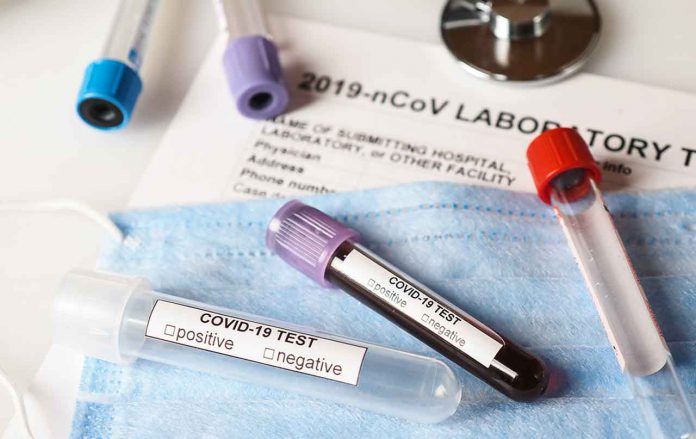Kenney Government Implements Severe COVID-19 Measure
EDMONTON – COVID-19 Update – Surging Second Wave COVID-19 numbers have the Province of Alberta under a State of Public Health Emergency.
Latest updates
- Over the last 24 hours, 1,077 new cases were identified.
- There are 383 people in hospital due to COVID-19, including 84 in intensive care.
- There are 14,052 active cases in the province.
- To date, 37,316 Albertans have recovered from COVID-19.
- There was an increase of 15,932 tests (2,173,038 total) for a total of 1,439,367 people tested.
- The testing positivity rate is 6.9 per cent.
- All zones across the province have cases:
- Calgary Zone: 5,126 active cases and 16,158 recovered
- South Zone: 664 active cases and 2,954 recovered
- Edmonton Zone: 6,444 active cases and 14,046 recovered
- North Zone: 789 active cases and 2,651 recovered
- Central Zone: 947 active cases and 1,418 recovered
- 82 active cases and 89 recovered cases in zones to be confirmed
- Additional information, including case totals, is online.
- Currently, 359 schools, about 15 per cent, are on alert or have outbreaks, with 1,288 cases in total.
- Of those, 169 schools are on alert, with 249 total cases.
- Outbreaks are declared in 190 schools, including 84 on watch, with a total of 1,039 cases.
- So far, in-school transmission has likely occurred in 209 schools. Of these, 115 have had only one new case result.
- Based on data available to date, 272 schools have been removed from the alert list.
- There are 534 active and 2,327 recovered cases at long-term care facilities and supportive/home living sites.
- To date, 324 of the 510 reported deaths (64 per cent) have been in long-term care facilities or supportive/home living sites.
- In the last 24 hours, there were 10 additional COVID-related deaths reported: one on Nov. 21, one on Nov. 23, five on Nov. 24, and three on Nov. 25.
- The total number of COVID-19 related deaths is now 510.
- Alberta is reporting case numbers and information daily, including on weekends and holidays.
Rapid COVID-19 test pilot to begin
- Alberta Health Services (AHS) and Alberta Precision Laboratories have been evaluating two types of COVID-19 rapid testing kits, approved by Health Canada and provided to provinces and territories by the federal government.
- The two point-of-care rapid testing systems will be rolled out in clinical pilots at several sites throughout the province over the coming weeks.
- PanBio rapid antigen tests will be used at one assessment centre in Calgary and one assessment centre in Edmonton. IDNow tests will be used at the COVID-19 assessment centres in Slave Lake and St. Paul, and at the hospital lab in Bonnyville.
- The tests will be used on patients who are within the first seven days of expressing symptoms, allowing health officials to quickly identify positive cases at testing sites, reducing the need for patient samples to be transported to centralized public laboratories for processing.
- The pilot will use more than 100,000 tests. Results will determine if the kits can be used widely across Alberta.
New acute care measures for visitors
- Effective Nov. 25, AHS introduced temporary measures for visitor access to AHS acute care sites that have an outbreak or are in communities where COVID-19 transmission is high (watch or enhanced status):
- For hospital patients, one designated family/support person under specific circumstances.
- For maternity and postpartum units, one designated family/support person. In addition, a doula or surrogate may be permitted.
- For pediatrics and NICU, including critical care, up to two designated family/support persons.
- For end-of-life, one designated family/support person; other visitors must be pre-arranged with the site or unit.
- For ambulatory care including emergency, one designated family/support person where possible.
- Restrictions may vary site-to-site. Albertans should review visitation guidelines and, where possible, arrange a phone call or virtual visit instead.
Strong restrictions to slow the spread of COVID-19
- New public health measures are being implemented across Alberta. These include mandatory provincewide measures and those targeted at regions under enhanced status.
- These new restrictions and increased enforcement will reduce the spread of COVID-19 in communities, protect hospitals, keep schools and businesses open as much as possible, and better protect vulnerable Albertans.
- Not following mandatory restrictions could result in fines of $1,000 per ticketed offence and up to $100,000 through the courts.
- All existing guidance and legal orders remain in place in all areas.
- Alberta Health, AHS and local municipalities continue to closely monitor the spread across the province.
Changes to contact tracing
- With the significant increase in new cases and demand, the AHS contact tracing team is facing a slowly growing backlog.
- To maximize the impact of case investigation and contact tracing, AHS will not call diagnosed cases who are no longer infectious.
- Instead of working in sequence, AHS will start with the most recently diagnosed cases to reach as many recent cases as possible. This will have the greatest benefit in preventing further transmission.
- Anyone not receiving a call will receive a text message from AHS providing them with guidance on if and when their isolation period has ended.
- All Albertans who test positive for COVID-19 will receive a text message to notify them when their isolation period will end.
- AHS continues to work to further increase its teams of contact tracers.
Albertans downloading tracer app
- All Albertans are encouraged to download the secure ABTraceTogether app, which is integrated with provincial contact tracing. The federal app is not a contact tracing app.
- Secure contact tracing is an effective tool to stop the spread by notifying people who were exposed to a confirmed case so they can isolate and be tested.
- Early issues have been fixed so the app can run in the background of all mobile devices.
- As of Nov. 26, 277,541 Albertans were using the ABTraceTogether app, 66 per cent on iOS and 34 per cent on Android. On average, 25 new users were registering every hour.
- Secure contact tracing is a cornerstone of Alberta’s Relaunch Strategy.
Symptoms for children and adults
- Everyone in Alberta should monitor themselves for symptoms.
- Adults over age 18 should stay home and get tested if they have any COVID-19 symptoms.
- Children should refer to the daily screening checklist for instructions.
- If a child has any of the core symptoms, they need to isolate for at least 10 days from the start of symptoms or until the symptoms are gone, whichever is longer, or until they test negative for COVID-19.
- Core symptoms for children: cough, fever, shortness of breath, loss of sense of taste or smell.
- For any other symptoms in a child, please assess the number of symptoms and follow the guidance in the checklist.
International traveller COVID-19 pilot
- An Alberta-Canada joint pilot program is testing an alternative to the 14-day quarantine requirement for international travellers while continuing to protect Canadians from COVID-19.
- Participants are closely monitored daily for symptoms and must follow enhanced preventive health measures, such as wearing masks in public places and avoiding visiting high-risk groups.
Influenza immunization
- Everyone, especially seniors and those at risk, is encouraged to get immunized against influenza.
- As of Nov. 21, 1,298,466 Albertans have received their flu shot.
- By appointment, doctors’ offices and participating pharmacies will immunize ages five and up.
- By appointment, public health clinics will immunize ages under five, their household members; people with no provincial health number; and where they are the only provider.
School health measures
- An online map lists schools with two or more confirmed cases, updated every school day.
- Government distributed more than 1.6 million reusable masks to 740,000 students and 90,000 staff.







